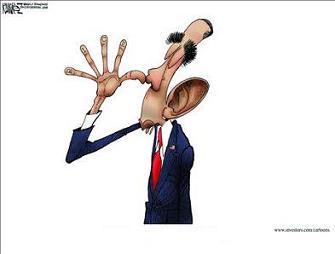 “Arrogance and Intolerance in the name of superior expertise are antithetical to popular governance and the requirements of honest argument. But that hasn’t stopped them from becoming a central feature of our political life.” Angelo Codevilla
“Arrogance and Intolerance in the name of superior expertise are antithetical to popular governance and the requirements of honest argument. But that hasn’t stopped them from becoming a central feature of our political life.” Angelo Codevilla
Obama said in 2009: “we will restore science to its rightful place.” Unpacked, this sentence meant that “under my administration, Americans will have fewer choices about how they live, and fewer choices as voters because, rightfully, those choices should be made by officials who rule by the authority of science.”
There is nothing new or scientific about rulers pretending to execute the will of a god or of an oracle. It’s a tool to preempt opposition. The ruler need not make a case for what he is doing; only affirm his status as the priest of knowledge to which the people cannot accede.
Because the pretense of rare knowledge is the only source of the modern administrative state’s intellectual and moral authority, its political essence is rule of the few, by their own authority, over the many. Ancient political theory was familiar with this category, distinguishing within it the rule of the moneymaker for the purpose of wealth, of the soldiers for glory, of the virtuous for goodness. But modern though has reduced government by the few to the rule of the experts.
In our time this priestly knowledge includes everything from environmentalism to child rearing. But whether the objective be rainmaking, the avoidance of plague or falling skies, the fulfillment of fond wishes, or the affirmation of identity, the ruler’s incantations establish the presumption that he and his class know things that others do not or cannot know; that hence he and his class have the right to rule, while the rest must accept whatever explanations come from on high.
The claim that public affairs are beyond the capacity of citizens to understand and too complex for them to administer, and hence that only certified “experts” may deal with them, must be cynical, at least to the extent to which those who make it realize that only theoretically does it transfer power to “the experts.”
What can any human possibly know that the knowledge of right places them in the saddle and others under it? What are the matters on which the public may have legitimate opinions, and on what matters are their opinions illegitimate, except when expressed by leave of certified experts? How does one accede to the rank of expert?
In his 1960 lectures at Harvard, C.P. Snow, who had been Britain’s civil service commissioner, told Americans that “In any advanced industrial society…the cardinal choices have to be made by a handful of men: in secret and, at least in legal form, by men who cannot have firsthand knowledge of what these choices depend upon or what their results may be.”
Translation: Public figures must be figureheads for scientists who are formally responsible to them but whose minds are beyond common understanding and scrutiny. Snow concluded that society’s greatest need was for change, and that scientists were “socially imaginative minds,” and while they should not administer, they should be part of the ruling Establishment.
President Eisenhower, however, in his farewell address, warned that the government’s embrace of science would corrupt itself and science. “. . .In holding scientific research and discovery in respect, as we should, we must also be alert to the equal and opposite danger that public policy could itself become the captive of a scientific technological elite.” The prospect against which Eisenhower warned has now become our reality. One accedes to the rank of expert, as anyone who has worked for a university knows, is by achieving success in getting grant money, primarily from the government.
Convincing people that what you may teach your children, what taxes you should pay, must be decided by the “scientific” pronouncements of members of a certain ruling class challenges the American concept of popular government. Government, by scientific pretense, runs against the grain of politics.
Human nature rebels violently against those who pretend to have special knowledge but then prove inept, whose prescriptions bring misery. When politicians lay out their reasons why something should or should not be done, when the pubic accepts those reasons, and then the ensuing measures bring grief, the public’s anger is tempered by its own participation in the decision, and that anger is poured out on the ideas themselves as well as on the politicians who espoused them.
But when politicians make big changes in economic and social life on the basis of “priestly knowledge” beyond the people’s capacity to understand, when events show them to have been wrong, when those changes impoverish and degrade life, then popular anger must crash its full force only on those who made themselves solely responsible. The failed sorcerers’ apprentices’ excuse “science made me do it” will only add scorn to retributions.
Source: Scientific Pretense vs. Democracy, American Spectator

